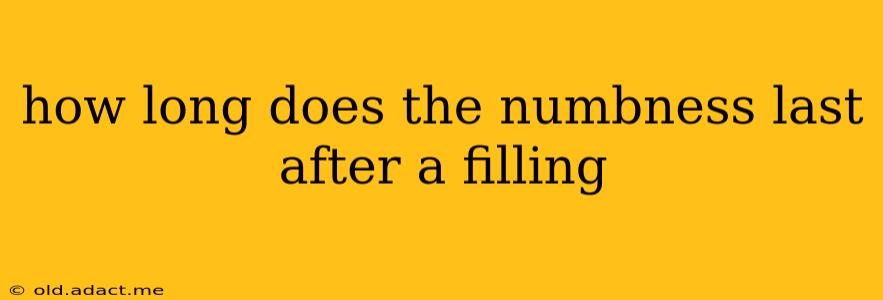How Long Does the Numbness Last After a Filling?
Getting a dental filling is a common procedure, but the lingering numbness afterward can be a source of concern for many. The duration of numbness varies depending on several factors, and understanding these factors can help manage expectations and alleviate any anxiety. This guide will delve into the typical timeframe, potential causes for prolonged numbness, and what to do if you experience unusual symptoms.
What Causes the Numbness?
The numbness you experience after a filling is a result of the local anesthetic (like lidocaine or prilocaine) administered by your dentist to numb the area before the procedure. This anesthetic temporarily blocks nerve signals, preventing you from feeling pain during the filling process. The duration of the numbness is directly related to the type and amount of anesthetic used, as well as the individual's metabolism.
How Long Does the Numbness Typically Last?
Generally, the numbness from a dental filling should wear off within a few hours, typically between 2 to 4 hours. However, this is just an average. Some individuals may experience numbness for a shorter period (as little as one hour), while others might feel its effects for a longer time (up to 6 hours or more). Several factors contribute to this variability:
What Factors Affect the Duration of Numbness?
- Type and Amount of Anesthetic: Different anesthetics have varying durations of action. The amount injected also plays a role; a larger injection will generally result in longer-lasting numbness.
- Individual Metabolism: How quickly your body processes the anesthetic significantly impacts how long the numbness persists. Faster metabolisms lead to quicker dissipation of the anesthetic.
- Injection Site and Technique: The precision of the injection influences the spread and duration of numbness. A more targeted injection might result in shorter-lasting numbness in a smaller area.
- Underlying Health Conditions: Certain medical conditions or medications can affect how the body metabolizes the anesthetic, potentially prolonging the numbness.
What if the Numbness Lasts Longer Than Expected?
If the numbness persists for more than 24 hours after your filling, it's crucial to contact your dentist. Prolonged numbness could indicate a potential complication, though it is usually not a serious concern.
Could I have Nerve Damage?
While rare, it is possible for nerve damage to occur during a dental procedure. However, this is usually accompanied by other symptoms besides just prolonged numbness, such as pain, tingling, or weakness in the affected area. If you experience any of these symptoms in addition to persistent numbness, seek immediate dental attention.
Is it Normal to Have Some Tingling After the Numbness Wears Off?
A slight tingling sensation or altered feeling in the area after the numbness subsides is often normal and usually resolves quickly. This is simply your nerves readjusting. However, persistent or intense tingling warrants a call to your dentist.
How Can I Manage Discomfort During the Numbness?
During the period of numbness, be cautious to avoid biting your cheek, lip, or tongue accidentally. The lack of feeling can lead to unintentional injury. Soft foods are generally recommended until the feeling returns to normal.
When Should I Call My Dentist?
Contact your dentist if:
- Numbness lasts longer than 24 hours.
- You experience pain, tingling, or weakness in the affected area.
- You have any other concerning symptoms.
Remember, your dentist is the best resource for addressing any concerns you might have about your dental procedure and its aftermath. They can assess your situation and provide personalized advice and treatment.
